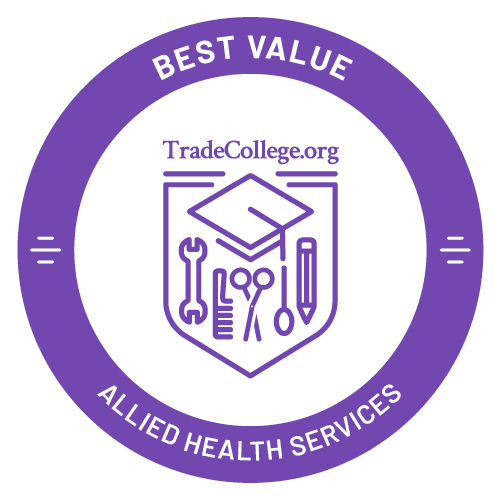Find Trade Colleges
2023 Best Value Allied Health Services Bachelor's Degree Schools in the Far Western US Region
Identifying Quality Schools at More Affordable Prices
Finding the Best Allied Health & Medical Assisting Services Bachelor's Degree School for You
In 2021-2022, 83,587 allied health & medical assisting services students received a degree or certificate, making the major the #3 most popular in the country.
When it comes to higher education, there are a lot of options for trade school students. You're no longer limited to schools in your local area, either, since online programs are becoming more prevalent.
To assist you in seeing some of the education options that are available to you, Trade College Search has created its Best Value Allied Health Services Bachelor's Degree Schools in the Far Western US Region ranking. Our analysis looked at 3 schools in the Far Western US Region to see which bachelor's degree programs offered the best value experiences for medical assisting students with the aim of identifying those quality schools that are more affordable than some of their counterparts.
This ranking is not just a list of inexpensive schools. We also consider each school's quality, since we believe a low-quality school may not be a 'bargain' at any price. More specifically, we discount our quality score by the published tuition and fees charged by a school. This gives the cost per unit of quality for each college. The value is determined by how much quality your dollar buys.
For nationwide and regional rankings, we use out-of-state tuition and fees in our calculations. Average in-state tuition and fees are used for our statewide rankings.
Featured schools near , edit
2023 Best Value Allied Health & Medical Assisting Services Bachelor’s Degree Schools in the Far Western US Region
The colleges and universities below are the best value schools for medical assisting majors pursuing a bachelor's degree.
Best Far Western US Region Schools for Affordable Quality for a Bachelor's in Allied Health Services
Our analysis found Spokane Community College to be the best value school for allied health & medical assisting services students who want to pursue a bachelor’s degree in the Far Western US Region . Located in the midsize city of Spokane, Spokane Community College is a public college with a medium-sized student population.
Out-of-state tuition fees for undergraduate students at Spokane Community College are $5,278 per year.
Out of the 3 schools in the Far Western US Region that were part of this year’s ranking, Highline College landed the # 2 spot on the list. Highline is a small public school located in the large suburb of Des Moines.
Out-of-state tuition fees for undergraduate students at Highline are $4,948 per year.
Read full report on Allied Health & Medical Assisting Services at Highline College
A rank of #3 on this year’s list means Santa Ana College is a great value for allied health & medical assisting services students working on their bachelor’s degree. Located in the city of Santa Ana, SAC is a public college with a very large student population.
The average tuition and fees for an out-of-state undergraduate student at SAC are $8,788 a year.
Best Allied Health & Medical Assisting Services Colleges by State
Explore the best allied health & medical assisting services colleges for a specific state in the Far Western US region.
| State | Degrees Awarded |
|---|---|
| Washington | 2,701 |
| California | 12,401 |
| Oregon | 882 |
| Nevada | 1,323 |
| Alaska | 191 |
| Hawaii | 209 |
Majors Related to Medical Assisting
Allied Health & Medical Assisting Services is one of 11 different types of trade school programs to choose from.
Medical Assisting Focus Areas
Majors Similar to Medical Assisting
| Related Major | Annual Graduates |
|---|---|
| Health & Medical Administrative Services | 88,600 |
| Practical Nursing & Nursing Assistants | 85,339 |
| Allied Health Professions | 83,905 |
| Health Sciences & Services | 36,762 |
| Mental & Social Health Services | 30,331 |
Notes and References
*These averages are for the top 3 schools only.
- The Integrated Postsecondary Education Data System (IPEDS) from the National Center for Education Statistics (NCES), a branch of the U.S. Department of Education (DOE) serves as the core of the rest of our data about colleges.
- Some other college data, including much of the graduate earnings data, comes from the U.S. Department of Education’s (College Scorecard).
More about our data sources and methodologies.


